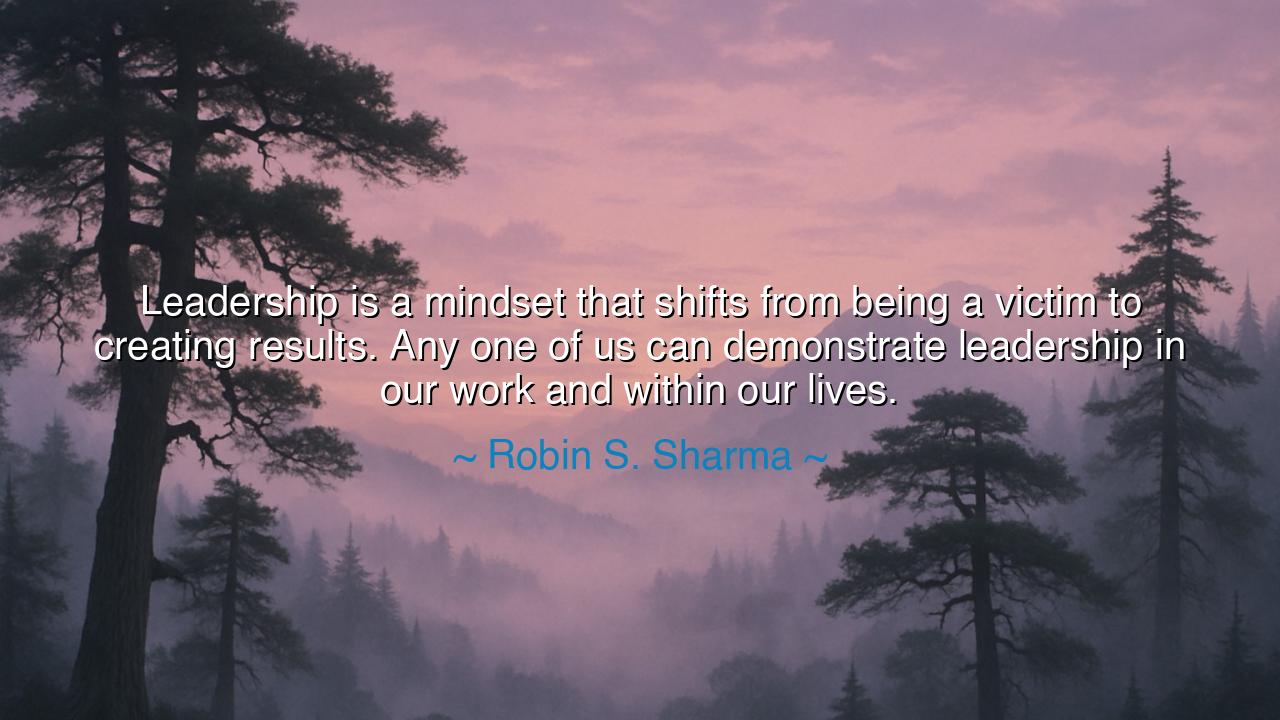
Leadership is a mindset that shifts from being a victim to
Leadership is a mindset that shifts from being a victim to creating results. Any one of us can demonstrate leadership in our work and within our lives.






Hear the words of Robin S. Sharma, teacher of self-mastery and guide of leaders, who declared: “Leadership is a mindset that shifts from being a victim to creating results. Any one of us can demonstrate leadership in our work and within our lives.” These words strike like a clarion call, for they shatter the illusion that leadership belongs only to kings, generals, or those with crowns and titles. Sharma reminds us that leadership is not first about position, but about perception—about the lens through which we view the world and the courage with which we act.
To be a victim is to surrender power, to place one’s destiny in the hands of others, to cry that life has acted unfairly. Many live in this state, bound by complaint and despair. But leadership arises when the soul awakens and says: “I will no longer be at the mercy of circumstance. I will choose action, I will choose creation, I will choose responsibility.” The shift from victim to creator is the birth of true leadership, for it is in this transformation that ordinary men and women become agents of change.
History has given us luminous examples of this truth. Consider Nelson Mandela, imprisoned for twenty-seven years, chained and silenced by injustice. He could have remained a victim, bitter and broken. Yet within the prison walls he chose the mindset of a leader—using his time to learn, to reflect, to prepare. When at last he was released, he emerged not with vengeance but with vision, guiding his nation toward reconciliation. Mandela proves Sharma’s words: leadership is the power to transform suffering into results, and even captivity into triumph.
Or recall Helen Keller, who was struck blind and deaf as a child. By all accounts, she was destined to remain a victim of silence and darkness. Yet through relentless struggle, she mastered language, and with it, she became a voice for justice, a writer, and an inspiration to millions. She could not change her limitations, but she changed her mindset, and in doing so, she exercised a form of leadership far greater than many crowned rulers. Her life stands as a monument to the truth that any one of us can demonstrate leadership in our lives.
The meaning of Sharma’s teaching is clear: leadership is not given—it is chosen. It is not found in titles or wealth, but in the willingness to stand in responsibility rather than complaint, in creation rather than passivity. To shift the mindset is to claim the authority that already resides within the human spirit. And this authority can be exercised not only in the great matters of history, but in the small details of daily work—how we treat our colleagues, how we care for our families, how we face adversity with resolve.
The lesson for us is profound: we must cease waiting for permission to lead. We must stop telling ourselves that leadership belongs to others, and recognize that it is a call for each of us. In every challenge, we are presented with a choice—to remain a victim, or to step forward as a leader, creating results that uplift ourselves and those around us. Even the smallest act of courage can ripple outward, shaping lives beyond our own.
And what actions must we take? First, examine your own mindset. Notice where you speak as a victim, where you blame, where you despair. Then, ask yourself: what can I create here? What result can I bring forth? Second, act with intention—whether in your labor, your friendships, or your dreams, step into responsibility. Third, remember that leadership is not about commanding others, but about guiding by example. Lead through integrity, humility, and courage, and others will follow your light.
Thus let Sharma’s words echo across generations: “Leadership is a mindset that shifts from being a victim to creating results.” Let each soul take this to heart, for in embracing it, we discover that leadership is not a distant prize, but a power already within us. And when we live it, in our work and in our lives, we become not only leaders of ourselves but lights for the world.






AAdministratorAdministrator
Welcome, honored guests. Please leave a comment, we will respond soon